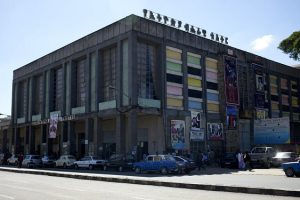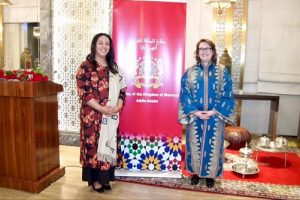BY MULUGETA GUDETA
Wars among nations often result from misunderstandings and mutual ignorance of the cultures and traditions of the belligerent parties. Otherwise, how can African countries that have common ancestries, cultures, languages and traditions often resort to force and violence to resolve their differences? Language is one facet of culture and the vehicle for the transmission of ideas and traditional practices.
But it is quite regrettable to realize that people who speak the same language often resort to violence against one another. Language alone cannot be an instrument of peace in relations among nations unless it is complemented with cultural exchanges among peoples of different nationalities or ethnic groups in Africa.
During the colonial times, Europeans used every trick in the book to prevent Africans from coming together and from knowing each other’s’ cultures.
This was done in order to prevent them from uniting to achieve a higher consciousness with culture as a great unifier against the common enemy. Since independence and more particularly since the formation of the continental organization that was known as the organization of African Unity (OAU) which is now known as the African Union (AU), African governments have been insisting on the need to achieve cultural exchanges among Africans as a way of achieving the long-drawn goal of continental unity.
The tragic fact is that European colonialists and their successors divided the African continent in such a way they could not attain integration and unity even after the defeat and ouster of the European colonialists. The artificial boundaries that were imposed on many African countries divided communities irrespective of their common cultures, traditions and languages.
Otherwise how Somalis living in Ethiopia and Somalia could be two ‘different’ communities belonging to two different countries? How could the Arab countries of North Africa who speak the same language and share a common ancestry and cultures could otherwise be divided so deeply that they still remain hostile to one another?
The same can be said about scores of other communities across the continent. After independence, Africans did little to overcome this artificial division and attain the unity and freedom they enjoyed before colonialism. The African elites that took control of the newly liberated African countries inherited the European legacy of division instead of rectifying and overcoming it. Thus Africans were divided by themselves more than Europeans divided them.
Worse still, Africans were kept ignorant of their mutual traditions and cultures and this ignorance serve the long-term strategies of Europeans to keep Africans apart and set them against one another long after the demise of colonialism.
This was largely true during the 20th century and remains so in this new century. The borders wars and internal conflicts within African countries, with a few exceptions, were the handiwork of the colonialists whose plan was to keep Africans caught in perpetual border wars and internal conflicts.
Africans have fought a many wars and endured countless conflicts since the end of the colonial era. This was mainly due to the failure of the African political elites to overcome this horrendous and divisive legacy of colonialism that is still keeping them busy with fighting unnecessary wars and suffer from unnecessary internal conflicts.
Back in 1994, The Tutsis and Hutus in Rwanda plunged themselves in a genocide that cost the lives of almost a million people as a result of the divide and rule policy of the Belgian colonialists who favored one ethnic group against the other and finally set them apart and provoked the worst ethnic genocide in human memory.
The political elites in Africa that followed on the footsteps of the European colonialists have failed to promote the overall re-integration of Africans through cultural exchanges. Africans live together in the same continent but have little knowledge of their respective cultures and traditions.
Egypt, Sudan and Ethiopia share a common history, culture, philosophy and even ancestry anchored in the fact that they drink the same Nile water and their civilizations blossom on the banks of this same legendary river. This could easily be a factor of cohesion and integration while it is now being used as a factor of mutual division and hostility.
This is mainly because the peoples of the three countries have not been allowed to know one another’s culture and tradition and were kept in the dark as their common interests that overshadow their divisions. In this sense, both the OAU and the AU have failed to live up to their mandate and proved powerless to avert division and promote cultural and economic integration.
In the face of official resistance or reluctance from the continental organization, it is the much maligned civil society organizations and associations that played however marginal role in attempts to promote cultural integration in this part of Africa.
Back in the 1980s Ethiopian musicians and artists launched what is known as “People to People” world tour that made great impact in bringing the music and arts of Ethiopia to Africa and the world in general. Since then no significant effort was made to keep this tradition alive.
The OAU could be a force behind such projects of cultural exchanges but has so far failed to play a leading role and the ideal of economic as well as cultural integration in Africa remains a dead letter.
The problem in this gigantic failure to promote cultural exchange in African with a view to achieving continental integration is the main players have always been the political elites while the African masses were kept in the margins of political decision making.
This democracy deficit has contributed to the powerlessness of Africans in the face of divisive policies of the elites and their foreign patrons. The situation has not changed in this age of globalization that tends to benefits the great economic powers at the determinant of weaker nations and all Africans as a united people.
The great economic powers favored a situation whereby Africans stand divided alone so that the latter can be easily manipulated so that the powerful can impose unpopular policies on them.
Had Africans be united around an integrated cultural and economic reality, they could have become a force to reckon with and this is what the great and mighty of this world want.
They want Africans to remain divided so that they can easily impose their policies on them. Africans are fond of the motto, “United we stand, divided we fall” which is inherited from the era of Kwame Nkrumah and the other pan –Africanist leaders.
However in practice, Africans are still divided and still on the verge of falling down. The wars, conflicts and genocides are vivid reminders of the final showdown between the forces of integration and division.
Egyptians, Sudanese and Ethiopians not only drink from the same Nile waters but they also share the good and the bad historical experiments that came and went during their centuries old existence as peoples living in the same region and sharing similar cultural, traditional and economic practices before colonialism came to divide them and sow the seeds of hostilities they are still unable to overcome.
If we look at the matter from the African perspective and Africa common interests, there is nothing substantial that can be a factor of division in relations between the three countries.
The above thesis holds true here too. Africans are divided and hostile to one another because they are not sufficiently aware that they are one people and they have a common destiny as they had a common past. The Nile is one of the greatest rivers in the world with the potentials to feed hundreds of millions of people in the continent and beyond.
Regrettably enough, the river is being used as a factor of division by those whose narrow interests cannot match the mighty potentials of the Nile. This is also the outcome of the ignorance that characterizes their relationships as they remain largely ignorant of their mutual cultures and traditions and the common features that tie their societies.
In order to appreciate the similarities in the psychology and aspirations of the peoples of Egypt and Ethiopia, one has to go no farther than reading a book by the great Egyptian writer Naguib Mahfouz. From his short novel entitled, “The Thief and the Dog” to his celebrated “Midaq Alley”, Mahfouz’s portrayal of Egyptian society has close resemblance to Ethiopian communities living for instance in the Mercato area in the Ethiopian capital Addis Ababa.
Both are settings for characters whose day to day struggles in the crowded alleys of Cairo and Addis, paint a vivid picture that are striking with the similarities of their aspirations and dreams. But how many Ethiopians know how the common people in Egypt live and dream?
If one thing is certain, ordinary Egyptians have no aspiration or dream of hurting their Ethiopian brothers and sisters or taking advantage of their poverty in order to build a better future only for them.
The absence of a people-to-people cultural understanding between the two countries has apparently led to grave distortion in mutual perception and allowed belligerent forces get the upper hand in the decision- making corridors of power.
How many Egyptians know about Ethiopia’s cultures and traditions other than the great feats of its long-distance runners? How many cultural delegations the two countries have exchanged in decades? What are the Egyptian movies Ethiopian moviegoers have seen so far and enjoyed them? In these circumstances, how can proper mutual perceptions can be built in the two countries that can lead to an awareness of their common African interests and common destinies?
The old colonialists left no stone unturned to keep Africans in the dark as to the commonness of their aspirations. The 21st century has done little to alter the old paradigm and build a new one.
It is the task of this generation of Africans in general and Egyptians, Sudanese and Ethiopians in particular to anchor their mutual perceptions on a concrete understanding of their cultures and traditions.
The failure of the past should serve as a lesson for the future to prevent history from repeating itself in a vicious cycle of ignorance-hostility-ignorance and so on. Culture is a great unifier but it requires a mighty hard work to realize this apparently simply statement.
The Ethiopian Herald January 30/2021





